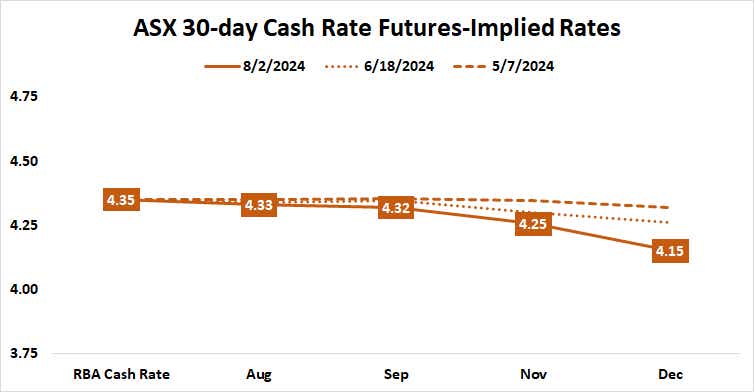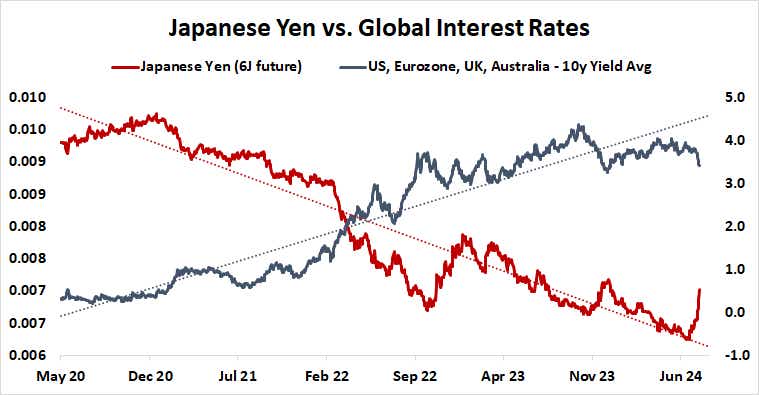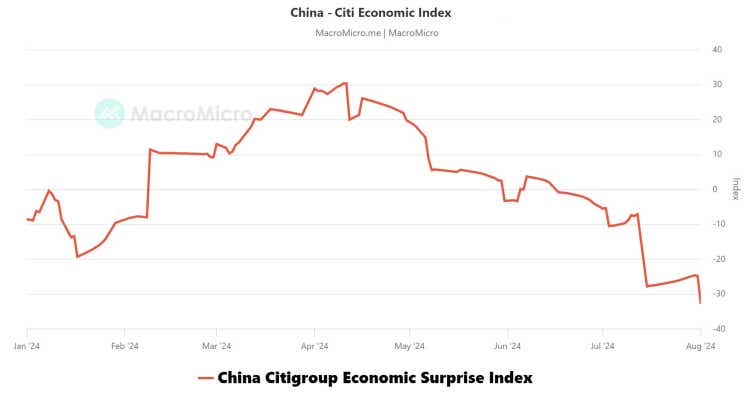Stocks Sink, Bonds and the Yen Take Off Amid Recession Fears

Stocks Sink, Bonds and the Yen Take Off Amid Recession Fears
By:Ilya Spivak
RBA meeting, China trade and inflation, BOJ and the yen: Macro Week Ahead
The Australian dollar may fall farther if a more dovish RBA boosts rate cut speculation.
The Japanese yen may erase some gains if the BOJ seems less hawkish than expected.
Downbeat Chinese economic data may amplify growing global recession worries.
A brutal selloff swept financial markets last week as worries about recession gripped investors, as expected. The bellwether S&P 500 stock index shed 2.2% while the tech-tilted Nasdaq 100 slid 3.2%. Treasury bond yields plunged as the markets bet that slowing growth will bring rapid rate cuts, lifting gold and the Japanese yen.
Against this backdrop, here are the macro waypoints likely to shape what comes next.
Reserve Bank of Australia (RBA) policy meeting
Australia’s central bank is expected to keep the target for its benchmark interest rate unchanged at 4.35% when it issues a policy update this week. As it stands, futures markets imply that traders have priced in 20 basis points (bps) in cumulative easing for this year, suggesting an 80% probability of a single 25bps rate cut before the calendar turns to 2025.
Leading purchasing managers index (PMI) data showed that economic activity growth stalled in July, producing the weakest performance since January. That follows three consecutive months of slowdown since service-sector growth peaked in March.
Analytics from Citigroup suggest that Australian macro data outcomes are tending to undershoot median forecasts, meaning that the consensus view of the economy is rosier than reality has ratified. Meanwhile, inflation cooled for the first time in four months in June, coming down to 3.8% year-on-year from a six-month high of 4% in May.
All this might set the stage for a more defensive tone from the RBA, with a bit more of a nod to the need for policy stimulus in the near term. This might inspire a dovish repricing of the baseline policy outlook, weighing on the Australian dollar. It may also add to global slowdown fears as yet another central bank frets about the business cycle.

Bank of Japan summary of opinions
Japan’s central bank will release a summary of the opinions discussed at its fateful meeting in July, when it surprised the markets with a 15bps rate hike. BOJ Governor Kazuo Ueda interestingly flagged the yen’s dramatic depreciation in the first half of the year in explaining the move.
By the time the central bank acted, the yen had already notched up a spirted 6% recovery against the U.S. dollar. Since then, it has added a further 5% as global yields drop amid global recession fears, as expected. With that in mind, traders will be keen to gauge how much of the BOJ’s hawkish stance hinges on the exchange rate.
Japanese inflation seems to be underpinned by food and energy prices, where the influence of high import costs courtesy of the weak yen is especially pronounced. If it appears that the BOJ is content with domestic price trends, once the currency is accounted for, its recent rebound may imply limited scope for further action. That might cool yen gains a bit.

China trade and inflation data
China is due to report July’s trade balance as well as producer and consumer price statistics (PPI and CPI, respectively). Export and import growth is seen accelerating from the previous month while the headline inflation gauge ticks higher to 0.4% year-on-year from 0.2% in the prior month.
Citigroup data suggests Chinese economic figures have increasingly deteriorated relative to baseline forecasts over recent weeks. That may set the stage for downside surprises that underscore the anemic state of the world’s second-largest economy. Such outcomes might amplify the risk-off tone across global markets as recession worries swell.

Ilya Spivak, tastylive head of global macro, has 15 years of experience in trading strategy, and he specializes in identifying thematic moves in currencies, commodities, interest rates and equities. He hosts Macro Money and co-hosts Overtime, Monday-Thursday. @Ilyaspivak
For live daily programming, market news and commentary, visit tastylive or the YouTube channels tastylive (for options traders), and tastyliveTrending for stocks, futures, forex & macro.
Trade with a better broker, open a tastytrade account today. tastylive, Inc. and tastytrade, Inc. are separate but affiliated companies.
Options involve risk and are not suitable for all investors. Please read Characteristics and Risks of Standardized Options before deciding to invest in options.
tastylive content is created, produced, and provided solely by tastylive, Inc. (“tastylive”) and is for informational and educational purposes only. It is not, nor is it intended to be, trading or investment advice or a recommendation that any security, futures contract, digital asset, other product, transaction, or investment strategy is suitable for any person. Trading securities, futures products, and digital assets involve risk and may result in a loss greater than the original amount invested. tastylive, through its content, financial programming or otherwise, does not provide investment or financial advice or make investment recommendations. Investment information provided may not be appropriate for all investors and is provided without respect to individual investor financial sophistication, financial situation, investing time horizon or risk tolerance. tastylive is not in the business of transacting securities trades, nor does it direct client commodity accounts or give commodity trading advice tailored to any particular client’s situation or investment objectives. Supporting documentation for any claims (including claims made on behalf of options programs), comparisons, statistics, or other technical data, if applicable, will be supplied upon request. tastylive is not a licensed financial adviser, registered investment adviser, or a registered broker-dealer. Options, futures, and futures options are not suitable for all investors. Prior to trading securities, options, futures, or futures options, please read the applicable risk disclosures, including, but not limited to, the Characteristics and Risks of Standardized Options Disclosure and the Futures and Exchange-Traded Options Risk Disclosure found on tastytrade.com/disclosures.
tastytrade, Inc. ("tastytrade”) is a registered broker-dealer and member of FINRA, NFA, and SIPC. tastytrade was previously known as tastyworks, Inc. (“tastyworks”). tastytrade offers self-directed brokerage accounts to its customers. tastytrade does not give financial or trading advice, nor does it make investment recommendations. You alone are responsible for making your investment and trading decisions and for evaluating the merits and risks associated with the use of tastytrade’s systems, services or products. tastytrade is a wholly-owned subsidiary of tastylive, Inc.
tastytrade has entered into a Marketing Agreement with tastylive (“Marketing Agent”) whereby tastytrade pays compensation to Marketing Agent to recommend tastytrade’s brokerage services. The existence of this Marketing Agreement should not be deemed as an endorsement or recommendation of Marketing Agent by tastytrade. tastytrade and Marketing Agent are separate entities with their own products and services. tastylive is the parent company of tastytrade.
tastyfx, LLC (“tastyfx”) is a Commodity Futures Trading Commission (“CFTC”) registered Retail Foreign Exchange Dealer (RFED) and Introducing Broker (IB) and Forex Dealer Member (FDM) of the National Futures Association (“NFA”) (NFA ID 0509630). Leveraged trading in foreign currency or off-exchange products on margin carries significant risk and may not be suitable for all investors. We advise you to carefully consider whether trading is appropriate for you based on your personal circumstances as you may lose more than you invest.
tastycrypto is provided solely by tasty Software Solutions, LLC. tasty Software Solutions, LLC is a separate but affiliate company of tastylive, Inc. Neither tastylive nor any of its affiliates are responsible for the products or services provided by tasty Software Solutions, LLC. Cryptocurrency trading is not suitable for all investors due to the number of risks involved. The value of any cryptocurrency, including digital assets pegged to fiat currency, commodities, or any other asset, may go to zero.
© copyright 2013 - 2025 tastylive, Inc. All Rights Reserved. Applicable portions of the Terms of Use on tastylive.com apply. Reproduction, adaptation, distribution, public display, exhibition for profit, or storage in any electronic storage media in whole or in part is prohibited under penalty of law, provided that you may download tastylive’s podcasts as necessary to view for personal use. tastylive was previously known as tastytrade, Inc. tastylive is a trademark/servicemark owned by tastylive, Inc.